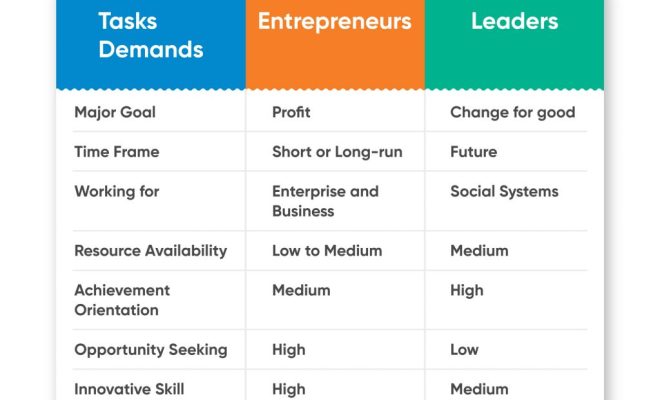Parallels Between Entrepreneurial Traits and School Leadership

Most school leaders don’t play a part in recruiting teaching staff, but are largely responsible for their development. Career development of teachers depends on the school culture and environment. School leadership must shape a school system in order to allow the growth of teacher professionalism and instructional capacity.
School leaders are supposed to shape teaching staff to gain other skills by assigning duties that are non-academic : e.g., bus duty, sports supervision, and coaching instruction. Similarly, school leaders should try to retain the most productive teachers without stifling their growth. The same predicament befalls entrepreneurs in Small Market Enterprises (SME’s). An entrepreneurial school leader strives to ensure that their school retains the most competitive, productive teaching staff, leading to better student results.
Good entrepreneurs conceive and implement workable communication channels to achieve meaningful results. School leaders could use this in dealing with teaching staff and students. Communication has always been an important part of leadership. Since successful entrepreneurs are good communicators, school leaders need to keep their communication channels open and develop good listening and negotiation skills.
School leaders also need to keep teaching staff motivated, because satisfied employees produce better results. It is up to the school leader to create innovative motivation techniques for staff satisfaction. While school leaders don’t have the same powers as entrepreneurs in raising teachers’ wages, they must implement non-monetary motivation techniques, such as creating a conducive workplace with reduced stress and burnout levels, and a friendly school culture.
Most teachers quit work for similar reasons as other employees, including feeling under-appreciated , broken agreements, harassment by superiors, or unpleasant working environments. Entrepreneurial school leaders should avoid the mistakes that lead to those situations. Employees associate leader empathy and fairness with a highly motivational culture. Therefore, school leaders should try to develop these traits. Job satisfaction is strongly influenced by the sense of job freedom, as well as satisfaction with the leadership style .
The basic requirements for successful entrepreneurship include appropriate wage systems, team building, and a satisfactory internal communication system. Since higher wages are not necessarily a motivator , team-building and internal communication systems are most applicable to the school setting.
Separating entrepreneurs into “employee friendly” and “employee distant,” we assess how these two entrepreneurial characters apply in relation to the teaching staff’s perception of the school leader.. “Employee friendly” leaders are more creative in designing the right motivational and communication structure in their organizations, and possess empathy and fairness, providing higher motivation and job satisfaction for employees than “employee distant” leaders. Teachers would almost certainly prefer the friendly leader over the distant one.
This preference, however, does not affect entrepreneurial leadership, since it is more concerned with ends than means. Entrepreneurial leaders find a balance between empathy and authority.
Empowering leadership behavior includes encouraging self-reward systems, self-leadership, opportunity perception, participative goal-setting, and autonomous behavior by followers. In the school setting, freedom should be granted to teachers where classroom instruction is involved, and they should also be involved in decision-making processes.
Empowering school leaders increase the motivation and confidence of their followers toward the accomplishment of the school objectives through positive encouragement and support. In the school setting, the school leader should distribute leadership among senior staff-members, who can assist in certain school administrative functions such as student discipline, running sports activities, and participating in tasks that can be delegated.
School leaders should draw a line between the issues that need consensus, and those where they should intervene and make quick decisions. As schools are diverse, due to the variety of careers and interests that converge in the school setting, school leaders should be careful not to allow the problems that come from diversity to slow down decision-making processes. It is advisable that entrepreneurial school leaders in dynamic environments where there is external pressure should avoid complex decision-making processes.
However, in stable environments, such as private schools, leaders can allow the empowered staff to spend more time considering what alternative strategies are available and exploring the potential for various activities, since consensus is not urgent.
Directive leadership behavior in the school setting is instructional in nature. School leaders should instruct teachers on matters regarding the curriculum, formulation of rules, and state policies on educational matters.
School leaders can create a common vision in their school through the setting of rules and by enforcing them through instruction. The benefits of this type of leadership are often faster decision-making and clearer goals.
Exceptional entrepreneurial leadership entails a combination of directive leadership and the other mentioned traits, such as empowerment, recruitment, motivation, and communication. School leaders who wish to pursue this entrepreneurial perspective in their running of the school should adopt this approach. A model of entrepreneurial leadership that is inclusive, participative, motivating, and directive seems to be the most suitable in the school setting.
When it comes to entrepreneurial leadership, research on the application of this model in the school setting is rare. Since the model has been used successfully in the business sector, we can relate the factors that enhance its success to the school setting by drawing parallels. It is possible that most school leaders may also be entrepreneurs, and therefore would embrace this leadership style, which involves the use of talents they may already possess.






